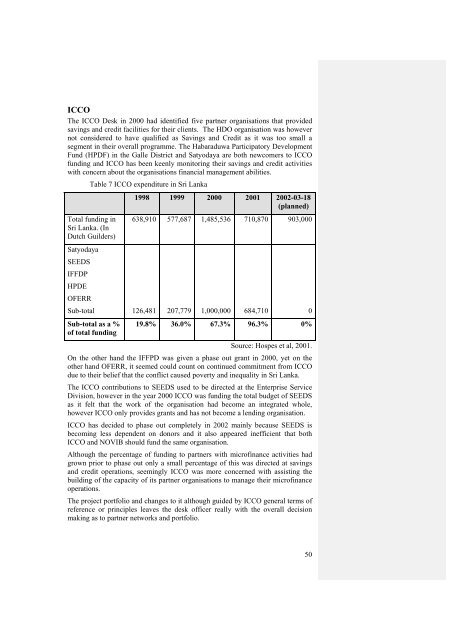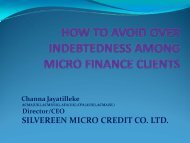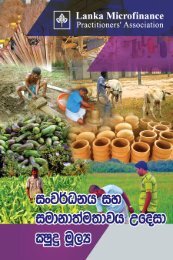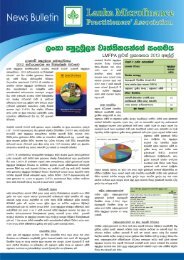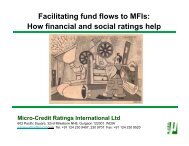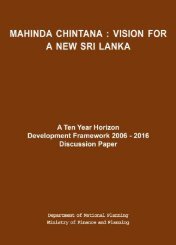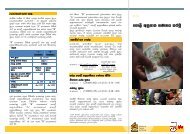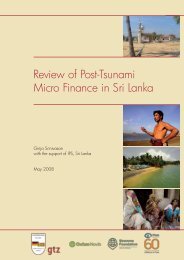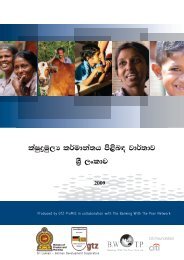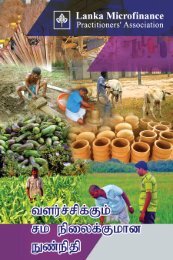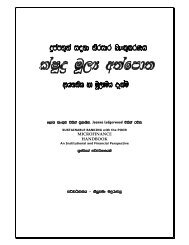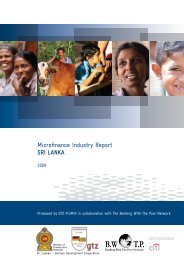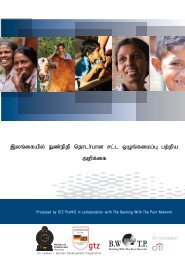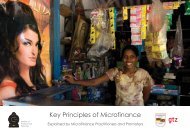National Microfinance Study of Sri Lanka: Survey of Practices and ...
National Microfinance Study of Sri Lanka: Survey of Practices and ...
National Microfinance Study of Sri Lanka: Survey of Practices and ...
Create successful ePaper yourself
Turn your PDF publications into a flip-book with our unique Google optimized e-Paper software.
ICCO<br />
The ICCO Desk in 2000 had identified five partner organisations that provided<br />
savings <strong>and</strong> credit facilities for their clients. The HDO organisation was however<br />
not considered to have qualified as Savings <strong>and</strong> Credit as it was too small a<br />
segment in their overall programme. The Habaraduwa Participatory Development<br />
Fund (HPDF) in the Galle District <strong>and</strong> Satyodaya are both newcomers to ICCO<br />
funding <strong>and</strong> ICCO has been keenly monitoring their savings <strong>and</strong> credit activities<br />
with concern about the organisations financial management abilities.<br />
Table 7 ICCO expenditure in <strong>Sri</strong> <strong>Lanka</strong><br />
Total funding in<br />
<strong>Sri</strong> <strong>Lanka</strong>. (In<br />
Dutch Guilders)<br />
1998 1999 2000 2001 2002-03-18<br />
(planned)<br />
638,910 577,687 1,485,536 710,870 903,000<br />
Satyodaya<br />
SEEDS<br />
IFFDP<br />
HPDE<br />
OFERR<br />
Sub-total 126,481 207,779 1,000,000 684,710 0<br />
Sub-total as a %<br />
<strong>of</strong> total funding<br />
19.8% 36.0% 67.3% 96.3% 0%<br />
Source: Hospes et al, 2001.<br />
On the other h<strong>and</strong> the IFFPD was given a phase out grant in 2000, yet on the<br />
other h<strong>and</strong> OFERR, it seemed could count on continued commitment from ICCO<br />
due to their belief that the conflict caused poverty <strong>and</strong> inequality in <strong>Sri</strong> <strong>Lanka</strong>.<br />
The ICCO contributions to SEEDS used to be directed at the Enterprise Service<br />
Division, however in the year 2000 ICCO was funding the total budget <strong>of</strong> SEEDS<br />
as it felt that the work <strong>of</strong> the organisation had become an integrated whole,<br />
however ICCO only provides grants <strong>and</strong> has not become a lending organisation.<br />
ICCO has decided to phase out completely in 2002 mainly because SEEDS is<br />
becoming less dependent on donors <strong>and</strong> it also appeared inefficient that both<br />
ICCO <strong>and</strong> NOVIB should fund the same organisation.<br />
Although the percentage <strong>of</strong> funding to partners with micr<strong>of</strong>inance activities had<br />
grown prior to phase out only a small percentage <strong>of</strong> this was directed at savings<br />
<strong>and</strong> credit operations, seemingly ICCO was more concerned with assisting the<br />
building <strong>of</strong> the capacity <strong>of</strong> its partner organisations to manage their micr<strong>of</strong>inance<br />
operations.<br />
The project portfolio <strong>and</strong> changes to it although guided by ICCO general terms <strong>of</strong><br />
reference or principles leaves the desk <strong>of</strong>ficer really with the overall decision<br />
making as to partner networks <strong>and</strong> portfolio.<br />
50


